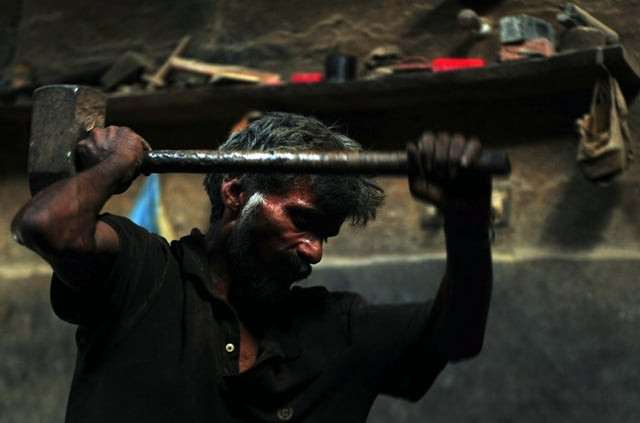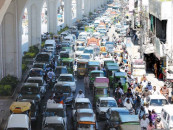Pakistan has no industrial safety law, government admits
'At present, there is no independent legislation on occupational safety and health issues in Pakistan' HRD Minister

PHOTO: AFP
"At present, there is no independent legislation on occupational safety and health issues in Pakistan," Human Resource Development Minister Pir Syed Sadaruddin Shah Rashidi told lawmakers at the National Assembly on Monday.
Rashidi said two years ago the Supreme Court had directed that a draft bill be submitted to provincial and federal governments to evolve a consensus, but that the court had given no timeframe for the exercise.
Child rights: ‘District committees will help eliminate child labour’
In November last year, 45 workers were killed and more than 100 were pulled alive from the rubble after the four-story Rajput Polyester polythene bag factory came crashing down in the eastern city of Lahore.
Officials said the facility may have suffered structural damage when a 7.5 magnitude earthquake hit Pakistan and Afghanistan in October, but workers blamed poor construction work for the collapse.
In 2012, at least 255 workers were killed when a fire tore through a clothing factory in Karachi, one of the deadliest industrial accidents in Pakistani history.
A judicial probe into the blaze was damning, pointing to a lack of emergency exits, poor safety training for workers, the packing in of machinery and the failure of government inspectors to spot any of these faults.
Asking for rights: HRCP holds National Labour Conference
Before its devastating fire, the Ali Enterprises factory was given a safety certificate, but the document was fake, issued by a company suspected of fraudulently "inspecting" around 100 Pakistani factories.
Many foreign companies are reluctant to send their own staff to inspect factories in a country beset by near-daily Islamist attacks.
Inspections are often farmed out to local contractors and it is difficult to get a clear picture of safety conditions in the factories, particularly as government inspectors are notoriously susceptible to bribery.
With workers paid around $100 a month, textiles make up more than half of Pakistan's exports, mainly bound for Europe.
Pakistan won the prized "GSP+" status in 2013 from the European Union (EU), a highly favourable tariff exemption regime that is a boon to textile exporters.
Ensuring labour rights
After GSP+, Pakistan's exports to EU increased from $6.21 billion in 2013 to $7.54 billion in 2014, and increase of 21 percent, according to commerce ministry statistics.
After the Karachi fire, the European Parliament told big brands to re-examine their supply chains in Pakistan and demanded the creation of a new effective and independent system to monitor factories.



















COMMENTS
Comments are moderated and generally will be posted if they are on-topic and not abusive.
For more information, please see our Comments FAQ